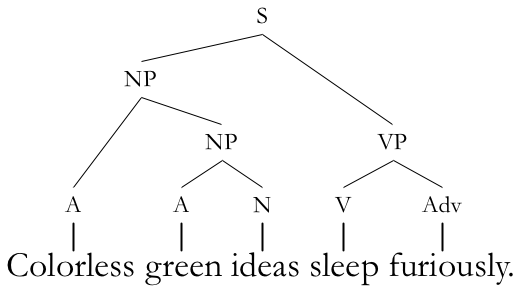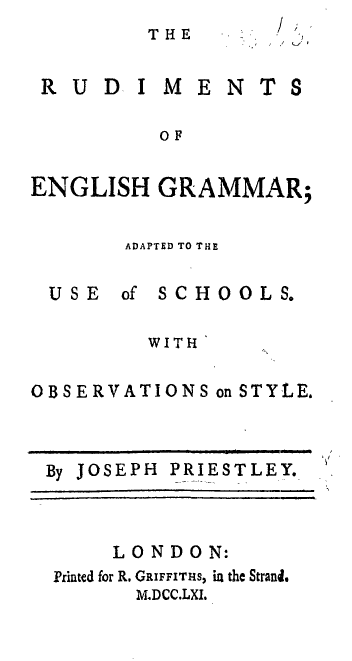|
Cognitive Approaches To Grammar
Cognitive approaches to grammar are theories of grammar that relate grammar to mental processes and structures in human cognition. While Chomsky's theories of generative grammar are the most influential in most areas of linguistics, other theories also deal with the cognitive aspects of grammar. The approach of Noam Chomsky and his fellow generative grammarians is that of an autonomous mental faculty that it is governed by mental processes operating on mental representations of different kinds of symbols that apply only within this faculty. Another cognitive approach to grammar is that which is proposed by proponents of cognitive linguistics, which holds that grammar is not an autonomous mental faculty with processes of its own, but that it is intertwined with all other cognitive processes and structures.{{Cite book , last=Green , first=Vyvyan Evans, Melanie , url=https://www.taylorfrancis.com/books/mono/10.4324/9781315864327/cognitive-linguistics-vyvyan-evans-melanie-green , title ... [...More Info...] [...Related Items...] OR: [Wikipedia] [Google] [Baidu] |
Grammar
In linguistics, grammar is the set of rules for how a natural language is structured, as demonstrated by its speakers or writers. Grammar rules may concern the use of clauses, phrases, and words. The term may also refer to the study of such rules, a subject that includes phonology, morphology (linguistics), morphology, and syntax, together with phonetics, semantics, and pragmatics. There are, broadly speaking, two different ways to study grammar: traditional grammar and #Theoretical frameworks, theoretical grammar. Fluency in a particular language variety involves a speaker internalizing these rules, many or most of which are language acquisition, acquired by observing other speakers, as opposed to intentional study or language teaching, instruction. Much of this internalization occurs during early childhood; learning a language later in life usually involves more direct instruction. The term ''grammar'' can also describe the linguistic behaviour of groups of speakers and writer ... [...More Info...] [...Related Items...] OR: [Wikipedia] [Google] [Baidu] |
Human
Humans (''Homo sapiens'') or modern humans are the most common and widespread species of primate, and the last surviving species of the genus ''Homo''. They are Hominidae, great apes characterized by their Prehistory of nakedness and clothing#Evolution of hairlessness, hairlessness, bipedality, bipedalism, and high Human intelligence, intelligence. Humans have large Human brain, brains, enabling more advanced cognitive skills that facilitate successful adaptation to varied environments, development of sophisticated tools, and formation of complex social structures and civilizations. Humans are Sociality, highly social, with individual humans tending to belong to a Level of analysis, multi-layered network of distinct social groups — from families and peer groups to corporations and State (polity), political states. As such, social interactions between humans have established a wide variety of Value theory, values, norm (sociology), social norms, languages, and traditions (co ... [...More Info...] [...Related Items...] OR: [Wikipedia] [Google] [Baidu] |
Cognition
Cognition is the "mental action or process of acquiring knowledge and understanding through thought, experience, and the senses". It encompasses all aspects of intellectual functions and processes such as: perception, attention, thought, imagination, intelligence, the formation of knowledge, memory and working memory, judgment and evaluation, reasoning and computation, problem-solving and decision-making, comprehension and production of language. Cognitive processes use existing knowledge to discover new knowledge. Cognitive processes are analyzed from very different perspectives within different contexts, notably in the fields of linguistics, musicology, anesthesia, neuroscience, psychiatry, psychology, education, philosophy, anthropology, biology, systemics, logic, and computer science. These and other approaches to the analysis of cognition (such as embodied cognition) are synthesized in the developing field of cognitive science, a progressively autonomou ... [...More Info...] [...Related Items...] OR: [Wikipedia] [Google] [Baidu] |
Linguistics
Linguistics is the scientific study of language. The areas of linguistic analysis are syntax (rules governing the structure of sentences), semantics (meaning), Morphology (linguistics), morphology (structure of words), phonetics (speech sounds and equivalent gestures in sign languages), phonology (the abstract sound system of a particular language, and analogous systems of sign languages), and pragmatics (how the context of use contributes to meaning). Subdisciplines such as biolinguistics (the study of the biological variables and evolution of language) and psycholinguistics (the study of psychological factors in human language) bridge many of these divisions. Linguistics encompasses Outline of linguistics, many branches and subfields that span both theoretical and practical applications. Theoretical linguistics is concerned with understanding the universal grammar, universal and Philosophy of language#Nature of language, fundamental nature of language and developing a general ... [...More Info...] [...Related Items...] OR: [Wikipedia] [Google] [Baidu] |
Noam Chomsky
Avram Noam Chomsky (born December 7, 1928) is an American professor and public intellectual known for his work in linguistics, political activism, and social criticism. Sometimes called "the father of modern linguistics", Chomsky is also a major figure in analytic philosophy and one of the founders of the field of cognitive science. He is a laureate professor of linguistics at the University of Arizona and an institute professor emeritus at the Massachusetts Institute of Technology (MIT). Among the most cited living authors, Chomsky has written more than 150 books on topics such as linguistics, war, and politics. In addition to his work in linguistics, since the 1960s Chomsky has been an influential voice on the American Left, American left as a consistent critic of U.S. foreign policy, Criticism of capitalism, contemporary capitalism, and Corporate influence on politics in the United States, corporate influence on political institutions and the media. Born to Ashkenazi Jew ... [...More Info...] [...Related Items...] OR: [Wikipedia] [Google] [Baidu] |
Generative Grammar
Generative grammar is a research tradition in linguistics that aims to explain the cognitive basis of language by formulating and testing explicit models of humans' subconscious grammatical knowledge. Generative linguists, or generativists (), tend to share certain working assumptions such as the competence–performance distinction and the notion that some domain-specific aspects of grammar are partly innate in humans. These assumptions are rejected in non-generative approaches such as usage-based models of language. Generative linguistics includes work in core areas such as syntax, semantics, phonology, psycholinguistics, and language acquisition, with additional extensions to topics including biolinguistics and music cognition. Generative grammar began in the late 1950s with the work of Noam Chomsky, having roots in earlier approaches such as structural linguistics. The earliest version of Chomsky's model was called Transformational grammar, with subsequent itera ... [...More Info...] [...Related Items...] OR: [Wikipedia] [Google] [Baidu] |
Cognitive Linguistics
Cognitive linguistics is an interdisciplinary branch of linguistics, combining knowledge and research from cognitive science, cognitive psychology, neuropsychology and linguistics. Models and theoretical accounts of cognitive linguistics are considered as psychologically real, and research in cognitive linguistics aims to help understand cognition in general and is seen as a road into the human mind. There has been scientific and terminological controversy around the label "cognitive linguistics"; there is no consensus on what specifically is meant with the term. Background The roots of cognitive linguistics are in Noam Chomsky's 1959 critical review of B. F. Skinner's ''Verbal Behavior''. Chomsky's rejection of behavioural psychology and his subsequent anti-behaviourist activity helped bring about a shift of focus from empiricism to mentalism in psychology under the new concepts of cognitive psychology and cognitive science. Chomsky considered linguistics as a subfield o ... [...More Info...] [...Related Items...] OR: [Wikipedia] [Google] [Baidu] |
Construction Grammar
Construction grammar (often abbreviated CxG) is a family of theories within the field of cognitive linguistics which posit that constructions, or learned pairings of linguistic patterns with meanings, are the fundamental building blocks of human language. Constructions include words (''aardvark'', ''avocado''), morphemes (''anti-'', ''-ing''), fixed expressions and idioms (''by and large'', ''jog X's memory''), and abstract grammatical rules such as the passive voice (''The cat was hit by a car'') or the ditransitive (''Mary gave Alex the ball''). Any linguistic pattern is considered to be a construction as long as some aspect of its form or its meaning cannot be predicted from its component parts, or from other constructions that are recognized to exist. In construction grammar, every utterance is understood to be a combination of multiple different constructions, which together specify its precise meaning and form. Advocates of construction grammar argue that language and cultu ... [...More Info...] [...Related Items...] OR: [Wikipedia] [Google] [Baidu] |
Cognitive Grammar
Cognitive grammar is a cognitive approach to language developed by Ronald Langacker, which hypothesizes that grammar, semantics, and lexicon exist on a continuum instead of as separate processes altogether. This approach to language was one of the first projects of cognitive linguistics. In this system, grammar is not a formal system operating independently of meaning. Rather, grammar is itself meaningful and inextricable from semantics. Construction grammar is a similar focus of cognitive approaches to grammar. While cognitive grammar emphasizes the study of the cognitive principles that give rise to linguistic organization, construction grammar aims to provide a more descriptively and formally detailed account of the linguistic units that comprise a particular language. Langacker first explicates the system of cognitive grammar in his seminal, two-volume work ''Foundations of Cognitive Grammar''. Volume one is titled "Theoretical Prerequisites", and it explores Langacker's hy ... [...More Info...] [...Related Items...] OR: [Wikipedia] [Google] [Baidu] |
Word Grammar
Word Grammar is a theory of linguistics, developed by Richard Hudson since the 1980s. It started as a model of syntax, whose most distinctive characteristic is its use of dependency grammar, an approach to syntax in which the sentence's structure is almost entirely contained in the information about individual words, and syntax is seen as consisting primarily of principles for combining words. The central syntactic relation is that of dependency between words; constituent structure is not recognized except in the special case of coordinate structures. However an even more important claim of Word Grammar is that statements about words and their properties form a complex network of propositions. More recent work on Word Grammar cites neurocognitive linguistics as a source of inspiration for the idea that language is nothing but a network. One of the attractions of the network view is the possibility of analysing language in the same way as other kinds of knowledge, given that knowled ... [...More Info...] [...Related Items...] OR: [Wikipedia] [Google] [Baidu] |
Grammar
In linguistics, grammar is the set of rules for how a natural language is structured, as demonstrated by its speakers or writers. Grammar rules may concern the use of clauses, phrases, and words. The term may also refer to the study of such rules, a subject that includes phonology, morphology (linguistics), morphology, and syntax, together with phonetics, semantics, and pragmatics. There are, broadly speaking, two different ways to study grammar: traditional grammar and #Theoretical frameworks, theoretical grammar. Fluency in a particular language variety involves a speaker internalizing these rules, many or most of which are language acquisition, acquired by observing other speakers, as opposed to intentional study or language teaching, instruction. Much of this internalization occurs during early childhood; learning a language later in life usually involves more direct instruction. The term ''grammar'' can also describe the linguistic behaviour of groups of speakers and writer ... [...More Info...] [...Related Items...] OR: [Wikipedia] [Google] [Baidu] |






